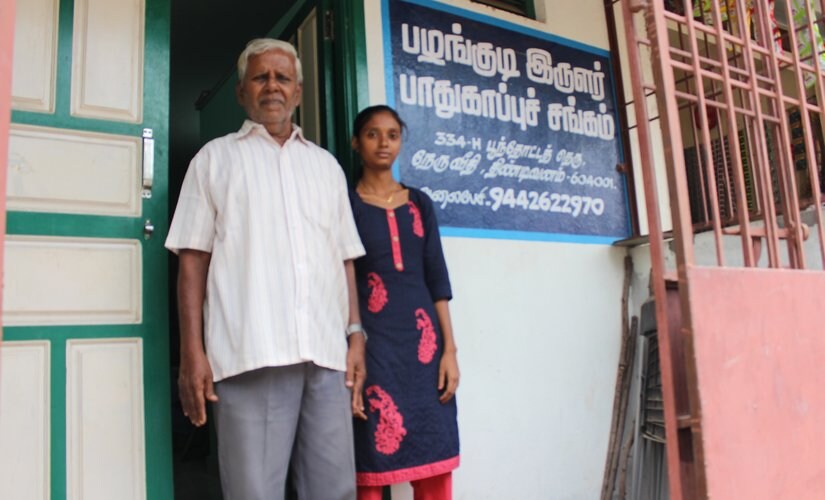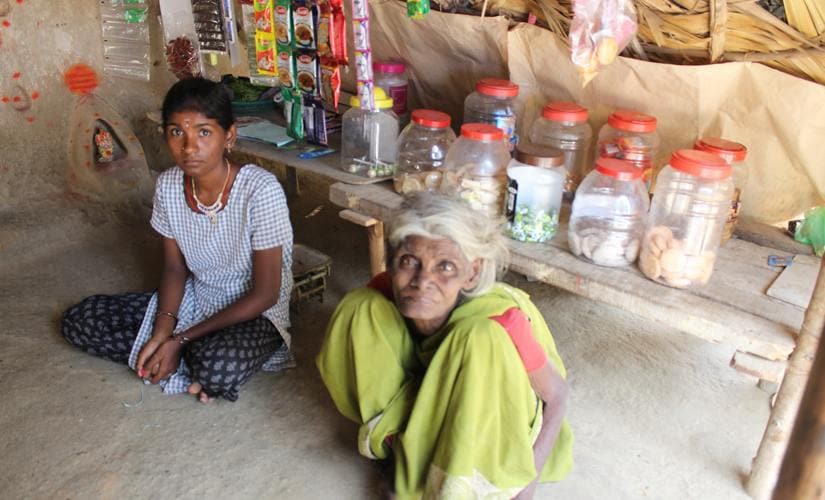Editor’s Note: In this eighteen-part series, we will attempt to address the tropes associated with the communities in question from an adivasi perspective while also exploring the contemporary relationship of adivasi citizens with the Indian government. This is the fourteenth article of the series on adivasi communities in peninsular India. The tiny office of the Pazhankudi Irular Pathukappu Sangam (PIPS), a movement working towards social protection and well-being of the Irular people, in Tindivanam, a small town in northern Tamil Nadu, is getting ready for a protest demanding the release of ten Irular recently arrested by the district police. On the evening of 26 August, Babu, who was visiting his mother’s home, and who was taking his pregnant wife Amaravathi to the doctor for a checkup, was picked up by cops from the Ulundurpet police station. “Three policemen barged into our home,” said Vasantha, Babu’s mother. “They dragged my son out, handcuffed him and took him away in a jeep. My pregnant daughter-in-law pleaded with them, asking why they were taking her husband, but they just pushed her away,” said Vasantha. Babu’s arrest was just the beginning. “On the same day, around 9 pm, the police arrested three others, Velu, Ramu and another Velu from the Irular hamlet at Keeranur. Three more Irular were arrested the next morning,” said professor Praba Kalvimani of the Pazhankudi Irular Pathukappu Sangam. “They took all the seven to an illegal detention space in Elavanasurkottai,” claimed Praba. [caption id=“attachment_7336991” align=“alignnone” width=“825”]  Professor Praba Kalvimani at the Pazhankudi Irular Pathukappu Sangam office in Tindivanam, along with Roja, a Irular girl.Image courtesy: Prema Revathi[/caption] PIPS activists attempted to alert the district Superintendant of Police and other officials on WhatsApp. On the night of 28 August, the seven persons were produced before a magistrate after allegedly being tortured. Babu was picked up almost 50 hours earlier. At 7 am on 2 September, three more Irular — all related to the seven taken from Villupuram district — were picked up from Thanjavur. They were working in a brick kiln owned by a TMC functionary. The Ulundurpet police produced them in front of a magistrate at 10 pm on 4 September. All the arrested persons were booked with regard to four different cases of theft from temples. But when Babu was picked up, the police told his mother they wanted to question him regarding a case involving a missing girl. In the other instances, the police refused to give any reasons for the arrests, activists claim, adding that they have also violated the Supreme Court ruling that an arrested person should be produced before a magistrate within 24 hours. On 26 November, 2011, four Irular women, including one that was pregnant, were taken into custody by the Tirukovilur police. The women later alleged that they were raped while in custody. The case is still pending before the high court, where the petitioners have demanded a CBI probe. Since the complainants did not have identity documents to prove that they were from Scheduled Tribes, provisions of the Scheduled Castes and Tribes (Prevention of Atrocities) Act, 1989 were not applied. Eventually, the women were taken into custody in connection with a theft in which their family were earlier arrested by personnel from the same police station. PIPS activists allege a sinister pattern: that police arrest, and torture Irular with regard to unsolved theft cases. The ten Irular picked up from their homes and places of work — in the presence of several witnesses — were allegedly shown to be picked up from locations close to the crime scenes, activists say. Consider the Vachathi rape case. The Tamil Nadu Tribals Association won a historic judgment which sentenced all accused from the police, revenue and forest departments (215 out of 269) for rape, molestation and other forms of humiliation of tribal women from Vachathi during a so-called raid in search of stolen forest produce. Tamil Nadu has a very small tribal population. According to the 2011 Census, the state has 36 tribes. They constitute 1 percent (7,29,806) of the state population. The Irular, classified as a particularly vulnerable tribal group, account for 25 percent of the ST population. As per the census, 1,74,224 Irular live in the state. “Their literacy rate is at 36 percent while the overall literacy rate of the state is at 80 percent,” said Praba. “Less that four percent have land. Less than 50 percent have pattas for housing plot. This would explain their living conditions.” The Irular are a displaced tribe found in the northern districts of Tamil Nadu and some parts of Nilgiris. A majority of the Irular living in the plains stay along water bodies and are semi-nomadic. Historically, they have been providing medicine for snake bites and other ailments. But in the past two decades, many have been taken into bonded labour by owners of brick kilns and rice mills. Before they are taken to brick kilns — usually far from their village — where they work for nine months, a typical Irular family takes between Rs 20,000 and Rs 30,000 as advance. Children accompany their parents and end up working. The Irular call this ‘chamber work’. For Roja, ‘chamber work’ has been the livelihood of her people from childhood. Her parents and brother have worked in chambers all their lives. Roja, however, decided to study. Thanks to two school teachers (Valarmathi and Suganthi), who encouraged and took care of her, Roja diligently studied and passed her Class 12 exams. “To go to college, I needed a caste certificate,” Roja said. “And that’s when I sought the help of PIPS.” Thanks to the efforts of Praba, Roja was admitted into college (to study Botany) under the open category. It took another year to obtain a caste certificate, after which she became eligible for an ST scholarship. Roja obtained her MSc, stood first in college and is now pursuing her PhD from Chennai’s prestigious Loyola College. “My father used to give herbs to people for ailments. He knows a lot about plants and herbs. It is that knowledge that motivated me to take up Botany. Today, getting an education shouldn’t be such a special thing,” said Roja. But getting a caste certificate, which is necessary to access education and other state entitlements earmarked for Scheduled Tribes, is seldom easy. The process to obtain a certificate is a relentless battle and for a tribal family to do this on their own remains an uphill task. In Tamil Nadu, to obtain a ST caste certificate, an application needs to be made at the regional district officer (RDO) level. “One would expect a government to be helpful to communities like Irular given their marginalised backgrounds. But on the contrary, while others get their caste certificate from the tehsildar, the Irular have to get it from the RDO, which makes it complicated and difficult,” said Venkata Subramanian, an activist working with the Irular. The State, which should ensure equality and dignity for all its citizens, is making things difficult for the most marginalised by creating hurdles to access constitutional entitlements, including obtaining certificates. However, there are other sources of support. In the remote village of Veeranamur, where 25 Irular families live, a small board announces the success of Sangeetha in her Class 12 exams and an award being given to her by a TV channel. The hamlet is near a big waterbody. [caption id=“attachment_7337011” align=“alignnone” width=“825”]  Sangeetha, who wants to become a nurse and treat her people, with her great grandmother Nagamma. Image courtesy: Prema Revathi[/caption] The huts are tiny thatch roofed structures, many without side walls or a proper floor. Sangeetha and her family were amongst the bonded labourers rescued by the International Justice Mission in 2009. During the 2015 floods, the hamlet was completely submerged. Activists like Rajesh Deena, who visited the hamlet for flood relief, assist the Veeranamur Irular in their struggle for housing and education of their children. “I was encouraged to study,” said Sangeetha, who wants to become a nurse and treat her people. “These annas promised that they will get me a caste certificate. So, I studied and now am going to join a nursing college. We are so far away from hospitals. Many a time, we do not have the means to go to a private clinic.” “My father used to treat people for snake bites and other ailments. People used to come from faraway places to fetch him. He’s even cured the almost dead,” she said, as her great grandmother Nagamma looked on with pride. For the Irular, fighting for their rights and battling the scourge of bonded labour, young women such as Roja and Sangeetha are a source of hope and pride. But the road ahead remains difficult for many: like the 40 families living around the Gingee Fort in Jaggampettai, Olakkur and the Mullai nagar forest area. Many do not have any documents such as a Ration Card or Aadhaar or until last month, even voter IDs. They work in neighbouring forests and fields and go for chamber work when the agents come. Most children are out of school. On the day we visited Settu, a bright-eyed long-haired little boy was getting ready to go to the special training centre in Sathyamangalam, Gingee. The Irular tribal social service centre is working on getting people their documents and enrolling children in schools. While Settu left happily for school, his elder brother refused to go. He felt he was too old to be in the first grade. A brick kiln job, which keeps children away for nine months, hampers the prospect of the Irular children getting a formal education. Irular leaders and educated youths have been have being urging the government to issue identity documents instead of creating bureaucratic and technical hurdles. Creating large-scale housing and livelihood projects to ensure that the Irular children get basic education is another demand. However, the only attention they seem to be attracting from the authorities is in the form of the police.
A majority of the Irular living in the plains stay along water bodies and are semi-nomadic.
Advertisement
End of Article


)

)
)
)
)
)
)
)
)



